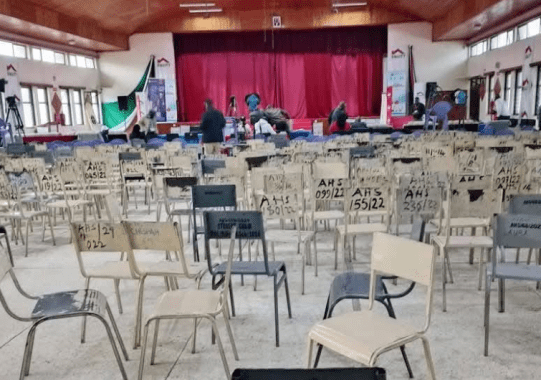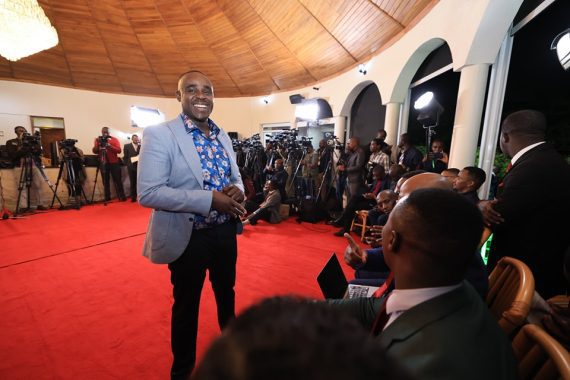When Butere Girls High School presented Echoes of War, a play written by former Kakamega Senator Cleophas Malala at the 2025 Western Region Drama Festivals and clinched a third position, the production immediately drew national attention after it was banned from proceeding to the national levels.
The play, which was later reinstated following a court ruling, became the latest addition to Malala’s catalogue of stage plays that have previously caused a stir within the festival.
Set in a fictional monarchy known as the Kingdom of Royal Velvet Emirates, Echoes of War follows Mustafa, a computer science student who invents a telemedicine platform that makes healthcare more accessible. Initially praised by the ruling Sultan for his innovation, Mustafa later faces condemnation after old social media posts resurface, in which he criticised the Sultan’s leadership.
The story unfolds around themes of political intolerance, digital surveillance, and the power of technology, placing Mustafa in conflict with authorities in what becomes a dramatic series of events.

The banning of the play sparked widespread debate, especially given Malala’s political background and previous associations with the current administration. This controversy, however, was not without precedent. Over the years, Malala has written several other school plays that have either been celebrated or met with resistance due to their subject matter and perceived relevance to contemporary issues.
Below are five other plays written by Malala that have significantly impacted the Kenya National Drama and Film Festival.
1. The Burdens
In the 2018 edition of the Kenya National Drama and Film Festival, The Burdens, performed by Kakamega High School, was awarded the national title. The play tells the story of a teenage boy accused of impregnating several girls and seducing a trainee teacher. However, the plot takes a turn when it is revealed that his behaviour is a reflection of misguided mentorship from a male house help named Daudi, who raised him while the parents were abroad.
The play explores how male children can be socialised into adopting harmful notions of masculinity and how the absence of responsible parenting contributes to such outcomes. It highlights the long-term consequences of exposure to toxic ideologies during formative years and raises questions about the socialisation of boys in modern society.
2. Police Brutality
In that same edition of the festival, Butere Girls presented Police Brutality, another Malala creation that dared to touch a raw national nerve.
The play is set in a socio-economically marginalised informal settlement bordering a privileged school reserved for the children of police officers. It explores how prejudice, fear, and hate are not innate traits but learnt behaviours passed down from one generation to the next.
The plot follows how the children of police officers—indoctrinated by their parents’ disdain for slum dwellers—begin to treat their neighbours with disdain, eventually mimicking the very patterns of brutality and injustice they have absorbed at home.
Malala uses this setting to drive home a chilling message: that violence and social injustice do not occur in a vacuum—they are carefully cultivated, often by those charged with protecting us.
3. Shackles of Doom
In 2013, Butere Girls High School took to the stage with a bold and stirring production titled Shackles of Doom, a play authored and directed by Cleophas Malala. The same school, now making headlines again over the contentious play Echoes of War, found itself at the heart of a national debate over a decade ago — for almost identical reasons.
Despite excelling through the zonal, district, and regional levels of the Kenya National Drama and Film Festival, Shackles of Doom was abruptly barred from appearing at the national stage. The festival’s committee cited political sensitivity as the reason for the disqualification, sparking widespread discussion on censorship and the role of theatre in confronting uncomfortable truths.

Set in a fictional land populated by a marginalised ethnic community known as the Kanas, the play delves into themes of land injustice, economic exploitation, and political exclusion. At the core of the plot is Wamaitha, a young Kana girl who is forced into marriage with a wealthy investor in exchange for development favours to her community. The investor’s company, meanwhile, establishes operations to extract oil from Kana territory but systematically hires outsiders, locking out the local population from meaningful employment and economic participation.
As tensions rise, resentment builds within the Kana community, leading to an eventual confrontation that turns fatal. The story, though fictional, struck a chord with many, drawing parallels to the real-life situation in Turkana County, where oil had recently been discovered amidst growing concerns about the marginalisation of local residents.
4. Godless
In 2012, Riara Springs Academy won the national title with Godless, another Malala-authored play. The production explored the spiritual confusion faced by a fictional society, highlighting the tension between outward religious practice and internal moral decay.
The script depicted how institutions and individuals often prioritise appearances and rituals over genuine ethical behaviour. It presented a critical look at how a society can appear religious while simultaneously experiencing moral breakdown, challenging audiences to consider the authenticity of their beliefs and practices.
5. Heaven
In 2018, Mukumu Girls High School performed Heaven, a play attributed to Malala, only for it to be disqualified after adjudicators discovered that the script had been copied almost word-for-word from another play titled The Antidote by playwright Allan Chahasi.
Following the revelation, the adjudicators ruled that the play did not meet the originality criteria of the festival and removed it from the competition. The incident raised concerns about plagiarism within the drama festival circuit and highlighted the importance of upholding intellectual property rights.
From social injustice and police brutality to political marginalisation and spiritual conflict, Cleophas Malala’s stage plays have sparked conversations, provoked reactions, and in some cases, led to institutional pushback. His scripts, written for school performances, have consistently drawn attention to complex societal issues, leaving a lasting impression on the Kenya National Drama and Film Festival landscape.